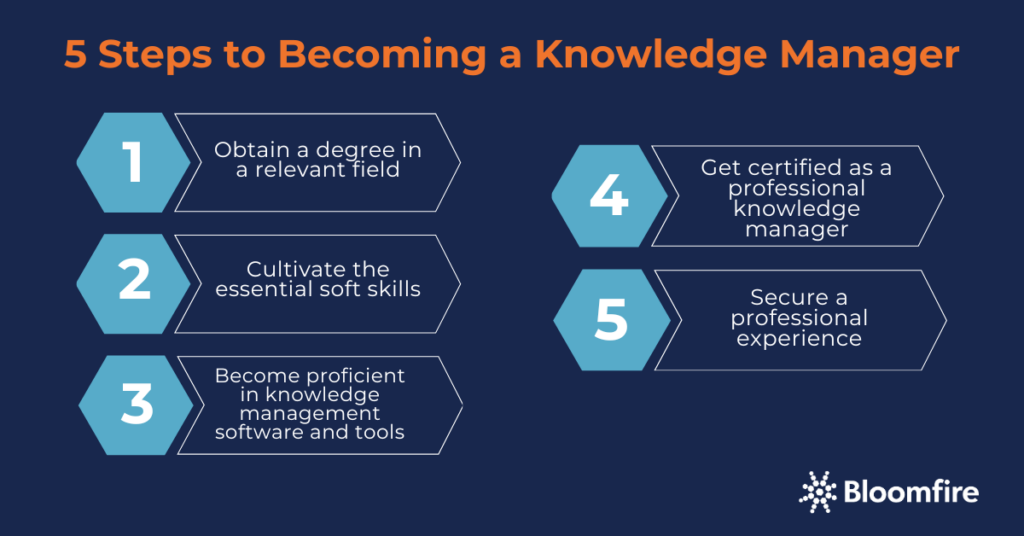How to Build a Career in Knowledge Management in 2025

Giants like Alphabet and Meta have demonstrated the immense power of effectively harnessing information. However, raw data alone isn’t enough. It needs to be refined and made accessible to fuel innovation and growth. This is where the role of a knowledge manager becomes indispensable.
Knowledge managers act as the architects and custodians of an organization’s intellectual capital. They ensure that valuable insights, lessons learned, and best practices are captured, organized, and readily available to the workforce.
As businesses progressively rely on data-driven decision-making, the demand for skilled knowledge managers continues to soar. If you’re looking for a career with impact and growth potential, learning how to become a knowledge manager is a path worth exploring.
What Does a Knowledge Manager Do?
A knowledge manager is responsible for ensuring that everyone in the company can access the information they need to succeed in their jobs. Beyond facilitating individual success, they champion the strategic use of the organization’s collective intelligence. This ensures it supports operational efficiency, innovation, and revenue growth.
Knowledge managers develop and implement systems for capturing, refining, and sharing valuable insights and expertise, keeping all information relevant and up-to-date. In essence, knowledge management responsibilities can be divided into three functions, which encapsulate the role of a knowledge manager:
1. Organizing company knowledge
Businesses receive a constant influx of knowledge and information from various sources. For example, a new hire might bring fresh skills and insights. Likewise, a product or research team might collect user data for a specific project or report, or a company might source information from a third party. Without someone to manage this knowledge, it can become lost, siloed, or overwhelming for employees to parse through.
Knowledge managers must implement a system for consistently collecting and structuring information, ensuring it remains easily accessible, usable, and shareable. This requires a thoughtful approach that considers user habits and behaviors, adapting knowledge management methodologies to suit best the specific needs and preferences of the individuals within the organization.
2. Evangelizing knowledge sharing
Capturing and organizing knowledge is difficult, but getting people to use and share it is even more challenging. That’s why knowledge managers must act as change agents who can promote a culture of knowledge sharing.
Successful knowledge management requires active engagement with the workforce. Knowledge managers must champion the system by providing comprehensive training, communicating its value and benefits to employees at all levels, and securing buy-in from key stakeholders. This may involve conducting software tutorials and addressing user inquiries. It could also be done through fostering a network of internal advocates who promote the system and encourage widespread adoption.
3. Optimizing knowledge system adoption
Knowledge management (KM) is an ongoing process that requires continuous evaluation and refinement. Even with a successful knowledge management framework and platform in place, knowledge managers must consistently analyze performance and identify areas for improvement. This involves monitoring key KM metrics such as:
- Contributions: How many people contribute to the platform, and how frequently do they contribute?
- Interactions: How much are people engaging with contributions? Are they commenting, liking, and sharing posts with their teammates?
- Response time: How long does it take for someone to respond to questions posted on your knowledge management platform?
- Account utilization: Of all total accounts, how many users are consistently active on the platform?
- Search activity: How often do people search for information, and what are the most common queries? What search keywords are people entering that don’t yield any results and may indicate that the organization needs to produce new content?
A great knowledge manager always seeks new ways to support knowledge sharing within the organization. You can do this by actively exploring innovative tools and resources or implementing knowledge management strategies to facilitate collaboration and learning.
How to Become a Knowledge Manager
The U.S. Bureau of Labor Statistics estimates that the broader category of “Computer and Information Systems Managers” (where knowledge managers belong) will grow 16% from 2021 to 2031, much faster than the average for all occupations.
In addition, salary data suggests strong earning potential for knowledge management professionals. According to Glassdoor, the average base pay for a knowledge manager in the United States is $84,844 annually as of January 2025.
All these data suggest that the knowledge management career path provides a multitude of potential, not just in earnings but in professional development. That said, there’s a good chance that it will eventually become competitive, which warrants adherence to specific requirements. To become a successful knowledge manager, you must satisfy the following requisites:

1. Obtain a degree in a relevant field
Pursuing a degree in a relevant field like information science, library science, or business administration provides a strong foundation for a successful career in knowledge management. These programs equip you with the theoretical knowledge and practical skills necessary to excel in this role.
You’ll gain a deep understanding of information organization, knowledge representation, data analysis, and information technology–all essential for effectively managing and leveraging organizational knowledge.
Furthermore, a relevant degree demonstrates your commitment to the field and gives you a competitive edge in the job market. It implies to potential employers that you possess the necessary expertise and are prepared to tackle the complex challenges of knowledge management.
You might wonder how to become a knowledge manager if your degree does not directly relate to the field. The good news is that you can still land the role as your educational background (while a strong groundwork for the job) is not the only gateway. Many successful knowledge managers come from diverse backgrounds and have achieved their roles through practical experience, skills development, and continuous learning.
2. Cultivate the essential soft skills
Knowledge management is often mistakenly perceived as purely technical, focused solely on databases and software. However, its true essence lies in building human interaction with information. It’s about fostering a dynamic environment where knowledge flows freely, fueling innovation and collective growth. This is where a knowledge manager’s soft skills become crucial.
Here are the top soft skills you must develop to lead in the game:
- Written and verbal communication: Effective communication requires clear and engaging delivery across various channels, from emails to presentations, tailored to diverse audiences. Building rapport with individuals who have different communication styles enhances both efficiency and job satisfaction. Plus, it helps you navigate communication issues at work with ease.
- Problem-solving: As with any job, knowledge management requires logical problem-solving and the ability to quickly develop effective, practical solutions. This analytical mindset is crucial for identifying knowledge gaps, streamlining processes, and troubleshooting system issues.
- Navigating organizational dynamics: Implementing knowledge management initiatives often requires navigating complex organizational structures, diverse personalities, and potential resistance to change. Knowledge managers need to be adept at conflict resolution, negotiation, and building consensus to ensure smooth transitions and widespread adoption.
- Cultivating trust and rapport: Knowledge managers must connect with individuals across all departments and seniority levels, encouraging them to contribute their unique expertise and insights. This people skill requires empathy, active listening, and effective communication with diverse audiences.
- Change management skills: As your organization’s reliance on information grows and technology advances, your knowledge management practices will also need to evolve. You should be well-versed in educating people and communicating the value of new methods or systems. Plus, you must show support to people through change with patience and empathy.
Aspiring knowledge managers can develop soft skills by actively seeking opportunities to practice communication, collaboration, and leadership. These may involve participating in group projects, joining professional organizations, and taking on mentorship roles. Continuous learning through workshops, online courses, and reading materials focused on communication, interpersonal skills, and leadership development can also enhance their soft skill set.
3. Become proficient in knowledge management software and tools
Knowledge management software and tools form the backbone of effective knowledge organization, storage, and dissemination. These may include content management systems (CMS), knowledge base software, collaboration platforms, and document management systems. Thus, it’s non-negotiable for a competent knowledge manager to master these technologies to ensure that information is readily available to those who need it.
To become formidable in using KM platforms and other tools, you must secure the hard skills required to operate the system. These may include the following:
- Digital organization: Given organizing information is a significant part of your job as a knowledge manager, you should be proficient in cleaning up messy file structures and arranging information in a hierarchy that makes knowledge easy to find and consume.
- Project management: You should feel comfortable managing big projects, like choosing and rolling out new knowledge management software or updating existing knowledge frameworks. And, as you rise to the ranks as a knowledge manager, you’ll likely be responsible for managing your team or department, too.
- Content management: Creating, editing, curating, and maintaining content in various formats (documents, multimedia, databases) within knowledge management systems. This includes ensuring content is accurate, up-to-date, and easily accessible to users while adhering to established style guides and organizational standards.
- Library science principles: Understanding cataloging, indexing, and classification systems to effectively organize and manage information resources. These skills enable knowledge managers to structure information logically. In turn, it makes it easily searchable and retrievable for users, regardless of their familiarity with the subject matter.
- Database management: Knowledge managers need a firm grasp of database structures and query languages to effectively extract, analyze, and leverage organizational knowledge for informed decision-making.
Proficiency in using various knowledge management platforms and tools provides significant leverage in fulfilling your role as a knowledge manager. Exploring the advanced features of these tools, such as content analytics, data mining, metrics and key performance indicators (KPIs) tracking, and information visualization, can further increase your hiring chances.
4. Get certified as a professional knowledge manager
While not always strictly required, becoming a certified professional knowledge manager can significantly enhance your career prospects. Certification validates your expertise and demonstrates a commitment to best practices in knowledge management, giving you a competitive edge in the job market.
Getting certified also signals to potential employers that you have the necessary knowledge and skills to implement and manage knowledge initiatives effectively. Furthermore, certification often involves rigorous training and assessments, which can deepen your understanding of key concepts and enhance your professional development.
If you’re wondering how to obtain a knowledge management certification, the KM Institute offers various programs, including its flagship certification, the Certified Knowledge Manager (CKM) course.
5. Secure a professional experience
Gaining practical experience in knowledge management often involves a combination of strategic job-seeking and proactive skill development. Look for roles that include elements of information organization, content management, training, or data analysis, even if they don’t have knowledge manager in the title.
Consider positions in libraries, information centers, corporate training departments, or even customer support roles where you can build knowledge bases and help others access information. Actively participate in projects that involve creating documentation, developing training materials, or implementing knowledge-sharing initiatives.
Next Step: Advancing Your Career in Knowledge Management
Once you have your foot in the door as a knowledge manager, prepare for more opportunities to climb the corporate ladder. To do this, you must consistently hone your competencies and reputation as a reliable knowledge manager.
Stay abreast of the latest trends and technologies by pursuing certifications, attending industry events, and engaging with thought leaders. Actively seek opportunities to expand your responsibilities, such as leading knowledge-sharing efforts, mentoring colleagues, or presenting at conferences.
Bonus tip: Learn How to Demonstrate the ROI of Your Efforts
One way to ensure senior leaders recognize the value of your work is by tying it directly to revenue and other specific company objectives. For example, the call-to-resolution time, customer satisfaction scores, or employee turnover drops after you roll out a KM solution to the customer support team. Communicate these results to senior management. Proving the ROI of knowledge management will ensure that you and your team are seen as an indispensable resource–and, by extension, your role as a knowledge manager.
Become an Effective Knowledge Manager
Knowledge management is a dynamic field that demands versatility and a broad skill set. It plays a vital role in today’s organizations, offering significant opportunities for career advancement and financial growth. You can unlock your potential and be successful in this impactful profession through continuous learning and leveraging powerful KM tools.
Note: We periodically update blogs to reflect the latest trends, research, and best practices in knowledge management. This blog was originally published in September 2022 and most recently updated and expanded in January 2025.
Don’t Get Left Behind!
Learn which KM software can propel your knowledge management career.
Get the KM Guide Now

10 Best Knowledge Management Practices in 2026

Different Types of Knowledge: Implicit, Tacit, and Explicit

Striking the Right Balance Between AI and Human Customer Service

Estimate the Value of Your Knowledge Assets
Use this calculator to see how enterprise intelligence can impact your bottom line. Choose areas of focus, and see tailored calculations that will give you a tangible ROI.

Take a self guided Tour
See Bloomfire in action across several potential configurations. Imagine the potential of your team when they stop searching and start finding critical knowledge.